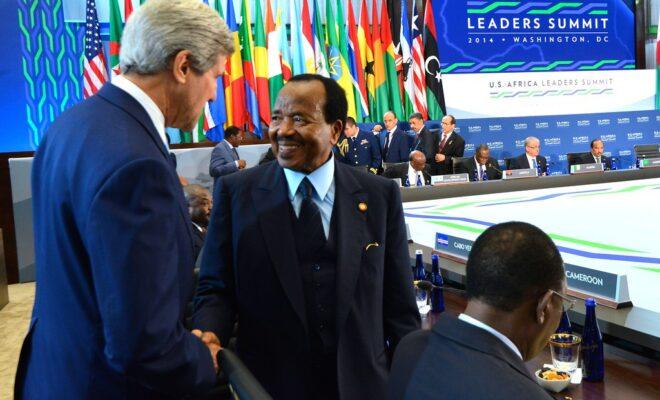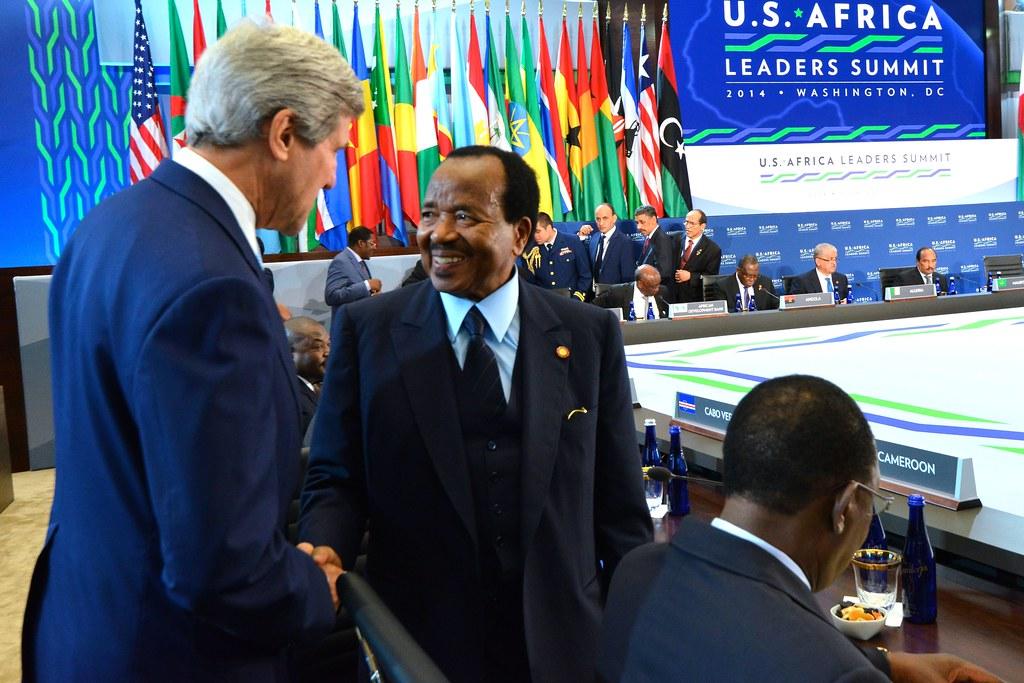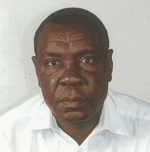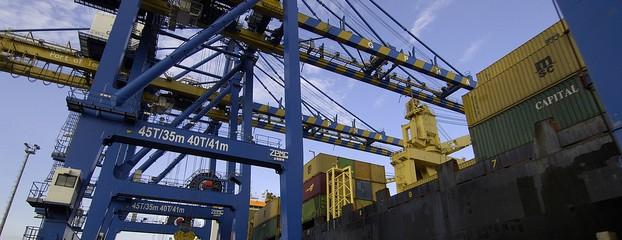Cameroon’s three deepening divides all have one thing in common

The Anglophone conflict is not the only crisis facing Cameroon.

President Paul Biya, 86, has been in power since 1982. Credit: US State Department.
After 37 years under President Paul Biya, Cameroon is arguably at its most divided yet. Various of its fault lines are deep, and they are getting even deeper.
The most immediate crisis facing the country is the ongoing Anglophone conflict in the two English-speaking regions, which has led to hundreds of deaths. But this situation is compounded by two other tensions in Cameroon, one ethnic, one religious.
President Biya, in power since 1982, stands defiant in the face of these pressures, but without clear action to address them, these challenges will only become more threatening to his rule and to the country.
1) The deadly Anglophone crisis
The Anglophone conflict began in 2016 when teachers and lawyers in Cameroon’s two English-speaking regions went on strike. They were protesting against the deployment of French-speaking judges and teachers with no understanding of the common law and educational systems that operate in these areas. The government seemed prepared to negotiate until more demonstrators joined and the group’s demands escalated into calls for more autonomy for the two regions. Anglophone nationalists have long demanded greater self-rule to address perceived marginalisation and protect their Anglo-Saxon heritage in the predominantly French-speaking country.
At this point, the government – as it has done many times in the past – resorted to force and mass arrests. The situation quickly escalated. Armed groups emerged calling for the English-speaking regions to secede completely from Cameroon as the independent state of Ambazonia. Fighting ensued with both separatist forces and the Cameroonian army allegedly committing widespread atrocities.
Three years on, the government in Yaoundé remains adamant that Cameroon’s decentralised unitary form of state is non-negotiable. However, this position is becoming increasingly untenable.
To start with, some key western governments, who previously only called for dialogue, have begun to take some concrete and sustained steps in relation to the conflict. This February, for instance, the US scaled down its military assistance to Cameroon citing gross human rights violations. In May, it sponsored the first UN Security Council meeting on the Anglophone conflict. And then, in July, its House of Representatives adopted Resolution 358 in July calling on the Cameroon government to reconstitute the federal system as one measure to resolve the crisis. That same month, Switzerland, which has a federal system and is another key partner, announced that it is leading a mediation effort. It has reportedly been discretely pressing Biya to look at its own model of territorial state organisation .
At the same time, domestic opinion in Cameroon is also shifting. As the separatist conflict wears on, moderate Francophones are increasingly subscribing to the idea of a federal state, something, which moderate Anglophones have long called for.
2) Renewed ethnic rivalries
Along with the Anglophone crisis, ethnic divides have also become more prominent in Cameroon, especially since the 2018 presidential elections. At the heart of these tensions are two groups’ competing claims to power.
The first, the Bamilieke, wield significant economic authority in Cameroon. Elites from this group control much of the economy and dominate the manufacturing industry. People from this ethnicity mostly occupy the west of Cameroon and have strong cultural ties to one of the Anglophone regions despite their Francophone colonial heritage.
The second, the Bulu-Beti axis, wield significant political power. Since Biya came to power, handpicked by Cameroon’s first president Amadou Ahidjo, elites from this group have seen themselves as the country’s natural rulers. The Beti and Bulu mostly reside in the centre and south regions.
The rivalry between the Bamilieke and Bulu-Beti axis came to a head in the run-up to the October 2018 presidential election in which President Biya ran for a seventh term against his main challenger Maurice Kamto, a Bamieleke. In the campaign, supporters of both sides engaged in inflammatory ethnic rhetoric, with the most xenophobic attacks coming from the Bulu-owned Vision4 Television.
In the end, Biya was declared the victor with 71.28%, but Kamto disputed the results, alleging widespread fraud. Tensions escalated, leading to some violent attacks on Cameroonian embassies in Berlin, Paris and elsewhere. Kamto, believed by many to have been the real winner of the polls, was arrested and remains incarcerated.
The government’s suppression of Kamto and his supporters mirrors its previous treatment of English-speakers. For example, the 2018 election followed a very similar pattern to that of 1992. In those polls, Biya’s main competitor was the Anglophone John Fru Ndi. That process was also marred by allegations of fraud and hate speech. In their aftermath, Biya placed Ndi, who is believed to have won the polls, under house arrest after declaring a state of emergency in his Ndi’s native North West region. The resentment created at this time added to a growing sense of exclusion, contributing to sentiments led to today’s Anglophone crisis.
Given the shared experiences of the Bamieleke and Anglophones, as well as cultural similarities, one might expect these groups to form an alliance. In fact, a leaked US embassy cable from 2011 suggested some regime insiders were discussing, and dreading, the prospect of such an “Anglo-Bami alliance”. In reality, such an alliance could be struck but would probably be short-lived, focusing only on ending Bulu-Beti dominance. On more fundamental questions such as the organisation of the state, cleavages would likely to emerge. Consensus on these points would not be impossible, but four decades of respective rule under the British and French during colonialism instilled differences in perspective and politics between these groups that would hard to overcome.
3) A religious group in waiting
A final divide facing Biya’s Cameroon comes from predominantly Muslim northerners, who are reportedly vying for one of their own to take over the presidency after Biya. In a leaked cable from 2009, Amadou Ali, an influential northerner who previously served in senior ministerial positions, said as much to US diplomats. According to the cable, Ali predicted that Cameroon’s three northern regions “will support Biya for as long as he wants to be president…but would not accept a successor who was either another Beti/Bulu, or a member of the economically powerful Bamileke ethnic group”.
Like the Bulu-Beti axis, Muslim from the north also see themselves as the natural rulers of a country whose population is majority Christian. And, as Ali explained, they have no intention of sitting idly by and letting an individual from any other group succeed Biya.
Cameroon’s divides today are varied and complex, but have one thing in common: They want to see Biya go. This includes even the northerners, albeit with less urgency, who have been among the president’s closest collaborators and governed with him from day one.
So far, the common goal of removing Biya has not been sufficient to unite these various different groups or force change. But as Cameroon’s divides continue to deepen, the question remains of how much longer the 86-year-old president hold it all together.
A version of this article was first published on Al-Jazeera.






I knew all along that Mr biya’s rule will eventually kill this country.
Very poorly researched article and here is why:
1) It’s Bamileke not ‘Bamieleke’.
2) Many of the key information you cite date from many years ago. e.g. “a leaked US embassy cable from 2011”, “In a leaked cable from 2009”. It seems to me you are out of touch with what’s happening in Cameroon. It would therefore be best to refrain from writing anything on it. For one, Kamto may be a bamileke but he is the president of a political party (called CRM, Cameroon Renaissance Movement) and it was as president of that party that he was nominated candidate for the 2018 presidential elections. Within the CRM party that voted him as president, you will find cameroonians from all ethnicity. In fact, the ethnic diversity of the party is strongly apparent when you look at the diversity among the key committee members.
3) Lastly, you are seriously mistaken to pull out the religious argument here. Deeply, deeply mistaken because that is one thing all cameroonians do not wish to drag into their battle for change. You can confirm this by looking at the crowd each of the 2018 presidential candidates gathered at their respective rallies during their campaigns be it in the north, south, east or west parts of Cameroon.
Cameroon is not Nigeria so, the religious card does not play here and please, don’t try to bring it in.
I usually read news about what’s happening in Africa based on articles from this platform. I used to assume the articles to be well-researched but upon reading this article on a topic I am slightly more acquainted with, I am profoundly disappointed.
A very well thought out and spoken rebuke by WIL SMITH. I agree, fully! We are no longer so concerned with religion or tribalism as in decades past. Cameroon HAS come into the 21st century!
Wil Smith, sorry to disagree, though not completely with your castigating response to the author of said article. As a pointer, in research, sources are selected to back up a point and the three cases were properly defended. I think he should have added Boko Haram given that the minds behind it were the very ones behind Amba Fighters, if you know that much. Secondly, in research, souces that go bak even twenty years cannot be dismissed as irrelevant especially as a pointer to a point being made. The author did not set out to write about contemporary Cameroun/Cameroon (if at all you know these are two distinct countries), but rather to make a futuristic prediction, which you could have added to or subtracted from. Thirdly, your castigation of the author does make one to think you are one of those who favor Cameroon remaining in union with Southern Cameroons. Please, if you are, take my warning seriously: until we are all killed, Southern Cameroons would never ever have anything to do with Cameroun. In fact, I would be one of those advocating that when the UNO State of Cameroon (86,214 sq km) comes into being and is flying UN Emblems and using the UNOC Currency, we should not have any diplomatic relations with Cameroun. They have betrayed our love for unity and now we want nothing but independence and we will defend our inalienable rights come what may!
The worst thing you said which exposed you as backing the horrible system operated in Cameroun, yet pretending to clamour for change is this:
[[3) Lastly, you are seriously mistaken to pull out the religious argument here. Deeply, deeply mistaken because that is one thing all cameroonians do not wish to drag into their battle for change. You can confirm this by looking at the crowd each of the 2018 presidential candidates gathered at their respective rallies during their campaigns be it in the north, south, east or west parts of Cameroon.
Cameroon is not Nigeria so, the religious card does not play here and please, don’t try to bring it in.]]
If religion is not a factor to determine the political future of this failed state paraded as Cameroon, just why did the Beti, Bulu, Eton and Ewondo (Fang) who hatched the failed 1984 coups against Biya to blame it on Muslims who were slaughtered in thier thousands (see Les Memoir de Jean Forchive; see also Les Memoir de Pierre Semengue (General of the Cameroun army who testified against the said coups!), why did the Agro Pastoral show in Ebolowa too many decades before holding??? The three Northern states said they were to boycott Ebolowa because that was where mass grave are holding their fallen brothers of the failed 1984 coup attempts (See Justice M. Mbuh, Inside Contemporary Cameroun Politics, 2005). It took much lobbying before the show held in 2011 did it not? So why should religion not be a factor when Marafa chorns out evidence from jail revealing plots against the northerners and muslims and why the regime is afraid to hand power back to the northerners?
If you are a Southern Cameroonian, I suppose you have witness the anatomy of anger and the results, though, and for your information, both Boko Haram and Amba were setup by Yaounde and Abuja! Their motif was to pretend cooperating with the UN in implementing the ICJ Ruling which stated that Bakassi was under Victoria division of a territory termed Southern Cameroons and are all comprised within British CAMEROONS. I suppose you have never taken time to read the ICJ Ruling so as to understand what is going on in Cameroon / Cameroun today.
Like Prof. Kamto Maurice who only woke up from slumber when the UN Secretary General Issued a letter demanding Cameroon and Nigeria submit withdrawal plans from Bakassi (22/11/2011), re-reading the ICJ Ruling led Maurice Kamto to realize that handing Bakassi back to the UN was a bad idea as far as Cameroon unity was concern so he opted to resign!
Of course a willing but equally power blinded Dr. Dion Ngute did the signing over of Bakassi back to whom???
I want to caution you about being too optimistic about Cameroun-Cameroon unity because we want our sovereign rights or else everything would be destroyed!
The Cameroun military did burn down SONARA because the regime had all along lied to them about so-called terrorists, secessionist and what have you. One Dr. Justice Mbuh was arrested and beaten up so badly by Tubah Gendarmes. In anger he revealed truths about the ICJ Ruling to the Lieutenant from Kribi who has him and his wife beaten until they passed out–for nothing but for posting picture of the American Missionary killed in Bambui. Mbuh then revealed to the lieutenant the truth about who won Bakassi and also the double game being played by the Cameroun deadly regime. The Lieutenant confronted the regime and is now currently in Kondengui detention. His friends whom he informed about what Mbuh told him sent messages to many Cameroun military Officers who were and are currently very angry. They burned down SONARA to show their disgruntlement with the regime which you seem to pamper. Be careful; you are not very savvy about Cameroun and should not take upon yourself to denigrate others about how much they know, when indeed they made good and acceptable point concerning the sorry ass country’s future!
So get ready for more rumblings in Cameroun-Cameroon. The UN can delay taking over on behalf of British Cameroons as much as they want; those looting resources can continue as much as they want; those of you dreaming about Cameroun-Cameroon union can equally continue dreaming–the truth remains that Cameroun is a torn state is is likely to disintegrate because a devil holds power and his cabinet and supporters are all occultic and God Almighty is about to pass judgment ON THAT ENCLAVE AND DESTORYING IT IS PART AND PARCEL OF THE SOLUTION!!!
is chloroquine an antibiotic https://chloroquineorigin.com/# hydroxychloroquine 200
cialis alternative buy cialis usa